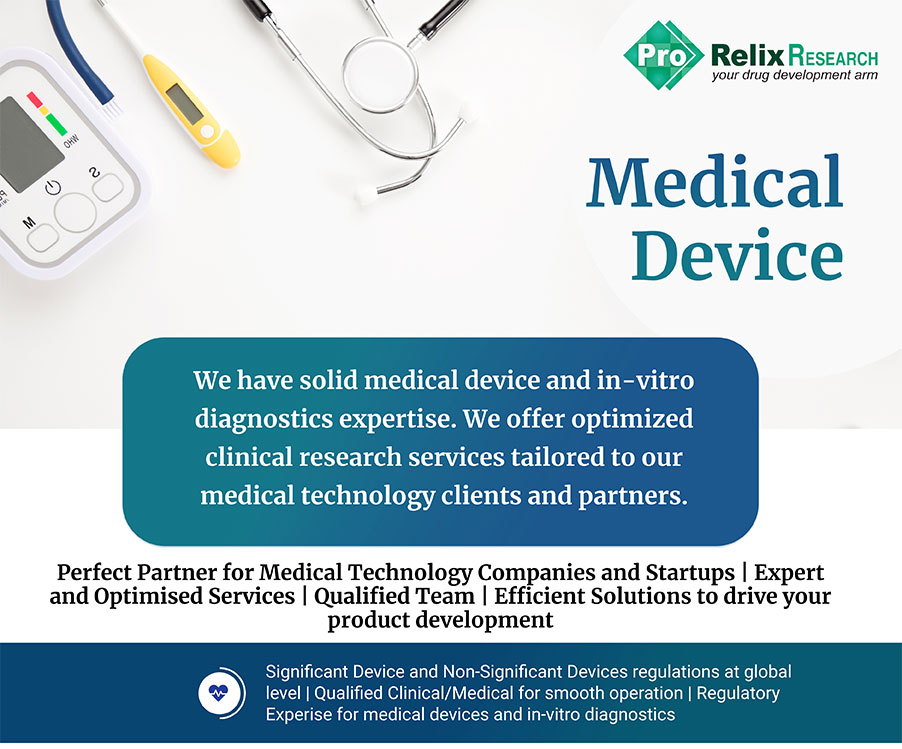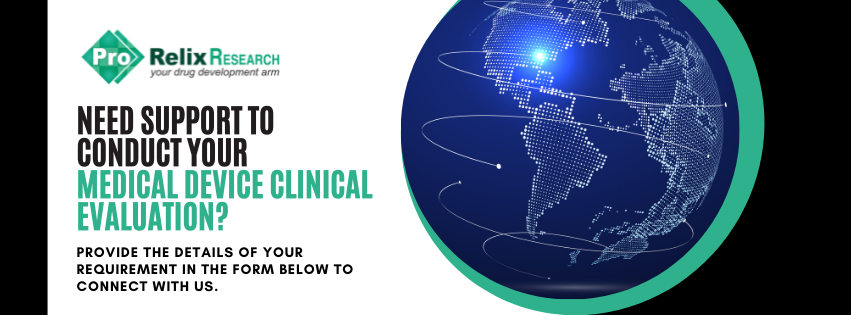Medical devices are an integral part of our lives from a simple thermometer to a life-saving pacemaker. Devising medical device clinical studies is complex and requires knowledge and experience-our experts at ProRelix Research can help you design studies depending upon the regulatory approval pathway to boost your chances of approval in a timely and cost-effective way.
Medical devices are defined as instruments or equipment that are intended for use in the diagnosis, cure, mitigation, treatment, or prevention of a disease by affecting the structure or function of the body without having any chemical action on any part of the body. The US FDA classifies devices into three classes, Class I, II, and III with increasing regulatory controls.
Class I devices pose a minimal risk to the user and typically do not require any premarket submissions. Examples of Class I devices are bandages, handheld surgical instruments, and nonelectric wheelchairs.
Class II devices pose a moderate risk to the user and most commonly require premarket notification before they can be marketed. Class II devices include computed tomography (CT) scanners or infusion pumps.
Class III devices such as implanted medical devices represent the highest risk to the user and require a premarket approval before being marketed. Implantable devices such as pacemakers and deep brain stimulators are some examples of Class III devices.
The risk profile of devices dictates the type of studies required for approval and the regulatory submission pathway which include:
- Most class I and some class II devices-exempt from review and premarket submissions but must comply with manufacturing and quality control standards.
- Most class II devices undergo a premarket notification 510(k) review which provides documented evidence to prove that the medical device is substantially equivalent to a predicate device that has already been approved for marketing by the FDA. These applications usually do not require clinical evidence.
- Class III devices require a premarket approval (PMA) application which requires data from clinical studies. Clinical studies for medical devices require an Investigational Device Exemption (IDE) to allow for use of the investigational device to collect safety and effectiveness data. This is usually required for a PMA and in some cases a 510(k) application.

Like the US FDA, the European Union Medical Device Regulations (EU MDR) divides medical devices into three classes, I, II (IIa and IIb), and III based on risk levels. Clinical evaluation of the medical device is necessary to obtain a conformity marking or CE-marking that allows for commercialization of medical devices in the EU. Class I devices must conform to good manufacturing practices (GMP) and quality control standards. Approval of class IIa devices is based on submission of adequate preclinical and literature data of device function to the notified body. Class IIa and III devices require submission of preclinical and clinical evidence of a device’s performance and safety to the regulatory body.
Unlike clinical trials for drugs that are designed to assess safety, tolerability, and pharmacokinetics and are divided into Phase I-IV, medical device trials are usually smaller in size and are focused on patient related outcomes of performance and safety. Device trials are divided into:
- Feasibility studies- these studies assess basic safety and effectiveness of a device and include 10-40 patients. FDA mainly reviews safety and risk/benefit profile from these studies.
- Pivotal studies-provide clinical evidence to support a PMA application and assess safety and effectiveness.

At ProRelix Research we provide end-to-end clinical trial support in accordance with GCP and ethical guidelines for devices. We guide you through the regulatory process to understand the types of studies required for submissions particularly clinical evaluations and help in the following areas:
- Device classification and choice of appropriate regulatory pathway
- Determination of type of clinical studies needed
- Assistance with development of a 510(k) submission: substantial equivalence package for 510(k) applications based on technological characteristics, performance characteristics, analytical studies and non-clinical bench performance compared to a predicate device
- Clinical trial support (Feasibility and Pivotal IDEs to support PMA, EU clinical investigations)
- Study design: type of study, sample size, inclusion/exclusion criteria, randomization, visit schedule
- Study startup activities: site selection and qualification, patient recruitment and retention
- Ethics committee approval
- Medical writing: creation of a clinical investigational plan, protocols, case report forms, investigator’s brochure, informed consent forms, clinical investigation reports
- Training programs: study-specific training, GCP training for site personnel
- Study monitoring and management activities: initiation, interim monitoring and close-out monitoring visits, maintenance of site files, ensure compliance with global and local regulations and quality programs, safety monitoring, deviation management and Corrective and Preventive Action (CAPA) programs, ‘mock’ audits and preparation for audits
- Data management: database lock and data transfer, database maintenance and archival, validation of electronic databases, design of electronic CRF (eCRF)
- Statistical analysis: sample size calculation, hypotheses testing, statistical analysis plan (SAP) development, statistical analysis, and interpretation of results
- Safety reporting: serious adverse event (SAE) reporting, periodic safety reporting
Need Support to Conduct your Medical Device Clinical Evaluation?
We’d be delighted to assist you in conducting your Medical Device Clinical Evaluation
Connect with our experienced staff today!!
Provide details of your requirements by clicking on the given link below and our professional team of clinical research experts will get in touch with you right away.




